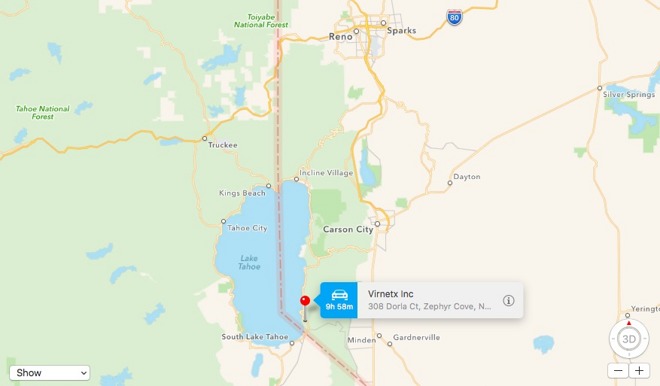After objecting to the closing arguments made by Caldwell, Cassady & Curry attorneys representing VirnetX, Apple has now filed a motion for mistrial in the case that awarded a $625 million verdict after just a week of testimony and deliberation.

VirnetX headquarters: a Lake Tahoe home far from East Texas
According to a report by Texas Lawyer, Apple's motion for mistral argues that VirnetX lawyers' closing remarks to the jury included "arguments outside the evidence and blatantly misrepresented the testimony of Apple's witnesses."
The East Texas trial made headlines this week after a jury returned a verdict finding Apple guilty of willfully infringing on four VirnetX patents in products including iMessage, FaceTime and VPN services.
A previous trial held in 2012 had earlier awarded VirnetX $368.2 million, but that verdict was vacated on appeal last September. As part of its appellate ruling, the U.S. Court of Appeals for the Federal Circuit called for a damages retrial.
VirnetX, disparagingly referred to as a patent troll, filed its case in the town of Tyler, Texas, within the state's Eastern District, despite the fact that the patent holding company is headquartered in the tiny Lake Tahoe village of Zephyr Cove, Nevada, next to Stateline casinos and the Heavenly ski resort at the resort town of South Lake Tahoe.
Why East Texas?
Texas' Eastern District has emerged as the "patent litigation capital of America" over the past few decades. In 2014, Texas Monthly profiled why Tyler and its nearby neighboring town of Marshall have become plaintiffs' preferred location for the majority of patent cases, despite the fact that most U.S companies are incorporated in Delaware. (Apple is incorporated in California, just over three hours west of Lake Tahoe).
It began with Texas Instruments in the mid-80s, which saved itself from bankruptcy by "turning its patent portfolio into a profit machine," the report noted, "aggressively suing other tech giants for infringing on its patents for the integrated circuit and microprocessor."
Within a decade, TI was earning more from patent lawsuits than it was from operations. However, as Federal Court dockets in Dallas, Texas grew clogged with drug-related criminal cases, TI moved its litigation further east to the small town of Marshall, which lacked an FBI office or U.S. attorney, resulting in a light caseload of criminal complaints.
The small towns of East Texas were also "ideal venue for intellectual property debates," the article noted, because the resident juror pool was largely uneducated ("only 20 percent of the towns adult population hold bachelor's degrees") while also having grown up "on the edge of one of the world's richest oil reservoirs, and royalty battles with oil companies have created a strong sense of property rights, whether they relate to patents or minerals."
Former federal magistrate judge Judith Guthrie was cited as noting that the area was "always popular with plaintiff's lawyers. The perception was that juries weren't as sophisticated as in other parts of the district."
Judges in the district have also set up rules for rapidly processing cases, resulting it being called "the rocket docket," another contributing factor to its attraction of companies seeking quick and easy verdicts on complex intellectual property claims.
Companies that actually build products, such as Apple and Google, have been lobbying Congress to close the loopholes that allow "non practicing" patent trolls to drag firms into East Texas courts for easy, streamlined verdict awards that involve little significant argument and generate huge jury awards that embolden trolls to continue.
President Obama has repeatedly addressed "costly, needless" patent litigation in his State of the Union addresses as an American problem that needs to be addressed, while at the opposite end of the political spectrum, Supreme Court justice Antonin Scalia has similarly referred to East Texas as being a "renegade jurisdiction."

